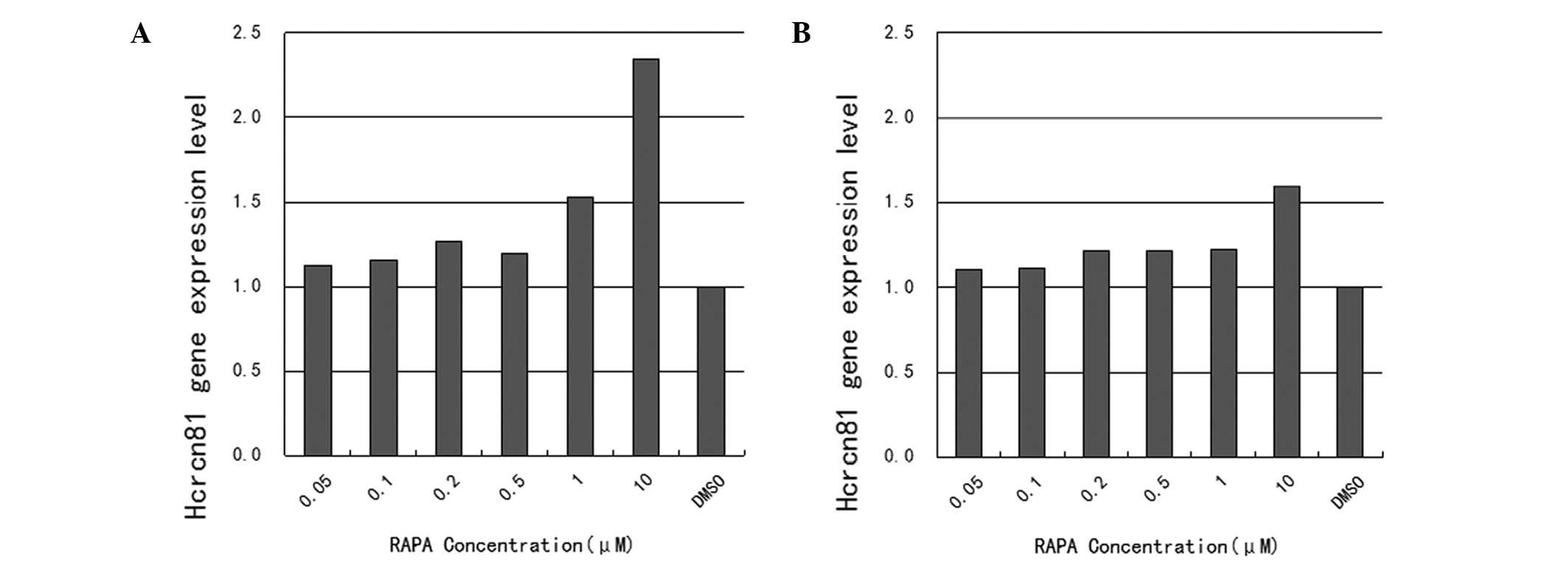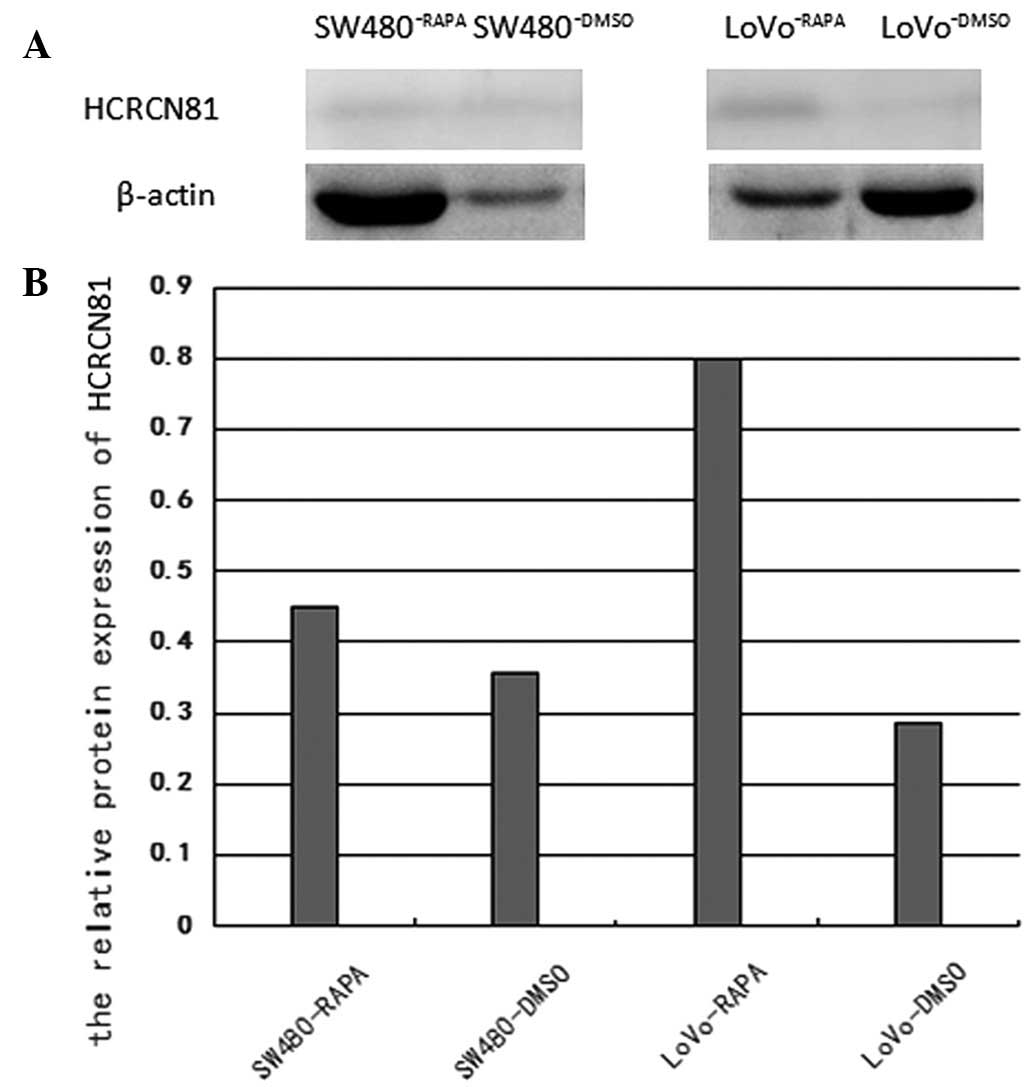|
1
|
Jemal A, Bray F, Center MM, Ferlay J, Ward
E and Forman D: Global cancer statistics. CA Cancer J Clin.
61:69–90. 2011. View Article : Google Scholar
|
|
2
|
Herrinton LJ, Liu L, Levin TR, Allison JE,
Lewis JD and Velayos F: Incidence and mortality of colorectal
adenocarcinoma in persons with inflammatory bowel disease from 1998
to 2010. Gastroenterology. 143:382–389. 2012. View Article : Google Scholar : PubMed/NCBI
|
|
3
|
Chen Y, Zhang Y, Zhou Z, Wang G and Yi Z:
Identification of differentially expressed genes in human
colorectal adenocarcinoma. World J Gastroenterol. 12:1025–1032.
2006.
|
|
4
|
Zhang C and Chen Y: Electronic cloning and
validating of the suppression subtractive hybridization EST
ES274070 of human colorectal adenocarcinoma. US Chin J Lymphol
Oncol. 6:83–88. 2007.
|
|
5
|
Jiang Q, Zhang C and Chen Y:
NM_001013649.3 gene is down-regulated in human colorectal
adenocarcinoma. Mol Med Rep. 4:1279–1281. 2011.PubMed/NCBI
|
|
6
|
Zoncu R, Efeyan A and Sabatini DM: mTOR:
from growth signal integration to cancer, diabetes and ageing. Nat
Rev Mol Cell Biol. 12:21–35. 2011. View
Article : Google Scholar : PubMed/NCBI
|
|
7
|
Laplante M and Sabatini DM: mTOR signaling
at a glance. J Cell Sci. 122:3589–3594. 2009. View Article : Google Scholar : PubMed/NCBI
|
|
8
|
Feng Z, Zhang H, Levine AJ and Jin S: The
coordinate regulation of the p53 and mTOR pathways in cells. Proc
Natl Acad Sci USA. 102:8204–8209. 2005. View Article : Google Scholar : PubMed/NCBI
|
|
9
|
Gulhati P, Cai Q, Li J, et al: Targeted
inhibition of mammalian target of rapamycin signaling inhibits
tumorigenesis of colorectal cancer. Clin Cancer Res. 15:7207–7216.
2009. View Article : Google Scholar : PubMed/NCBI
|
|
10
|
Chiang GG and Abraham RT: Targeting the
mTOR signaling network in cancer. Trends Mol Med. 13:433–442. 2007.
View Article : Google Scholar : PubMed/NCBI
|
|
11
|
Miyake N, Chikumi H, Takata M, Nakamoto M,
Igishi T and Shimizu E: Rapamycin induces p53-independent apoptosis
through the mitochondrial pathway in non-small cell lung cancer
cells. Oncol Rep. 28:848–854. 2012.PubMed/NCBI
|
|
12
|
Bustin SA, Benes V, Garson JA and
Hellemans J: The MIQE guidelines: minimum information for
publication of quantitative real-time PCR experiments. Clin Chem.
55:611–622. 2009. View Article : Google Scholar : PubMed/NCBI
|
|
13
|
Roy HK, Olusola BF, Clemens DL, Karolski
WJ, Ratashak A, Lynch HT and Smyrk TC: AKT proto-oncogene
overexpression is an early event during sporadic colon
carcinogenesis. Carcinogenesis. 23:201–205. 2002. View Article : Google Scholar : PubMed/NCBI
|
|
14
|
Johnson SM, Gulhati P, Rampy BA, et al:
Novel expression patterns of PI3K/AKT/mTOR signaling pathway
components in colorectal cancer. J Am Coll Surg. 210:767–778. 2010.
View Article : Google Scholar : PubMed/NCBI
|
|
15
|
Vilar E, Mukherjee B, Kuick R, et al: Gene
expression patterns in mismatch repair-deficient colorectal cancers
highlight the potential therapeutic role of inhibitors of the
phosphatidylinositol 3-kinase-AKT-mammalian target of rapamycin
pathway. Clin Cancer Res. 15:2829–2839. 2009.
|
|
16
|
Thimmaiah KN, Easton J, Huang S, Veverka
KA, Germain GS, Harwood FC and Houghton PJ: Insulin-like growth
factor I-mediated protection from rapamycin-induced apoptosis is
independent of Ras-Erk1-Erk2 and phosphatidylinositol 30-kinase-Akt
signaling pathways. Cancer Res. 63:364–374. 2003.PubMed/NCBI
|
|
17
|
Boffa DJ, Luan F, Thomas D, Yang H, Sharma
VK, Lagman M and Suthanthiran M: Rapamycin inhibits the growth and
metastatic progression of non-small cell lung cancer. Clin Cancer
Res. 10:293–300. 2004. View Article : Google Scholar : PubMed/NCBI
|
|
18
|
Medici D and Olsen BR: Rapamycin inhibits
proliferation of hemangioma endothelial cells by reducing
HIF-1-dependent expression of VEGF. PLoS One. 7:e429132012.
View Article : Google Scholar : PubMed/NCBI
|
|
19
|
Samkari A, Cooper ZA, Holloway MP, Liu J
and Altura RA: Rapamycin induces the anti-apoptotic protein
survivin in neuroblastoma. Int J Biochem Mol Biol. 3:28–35.
2012.PubMed/NCBI
|
|
20
|
Sun J and Jin T: Both Wnt and mTOR
signaling pathways are involved in insulin-stimulated
proto-oncogene expression in intestinal cells. Cell Signal.
20:219–229. 2008. View Article : Google Scholar : PubMed/NCBI
|
















